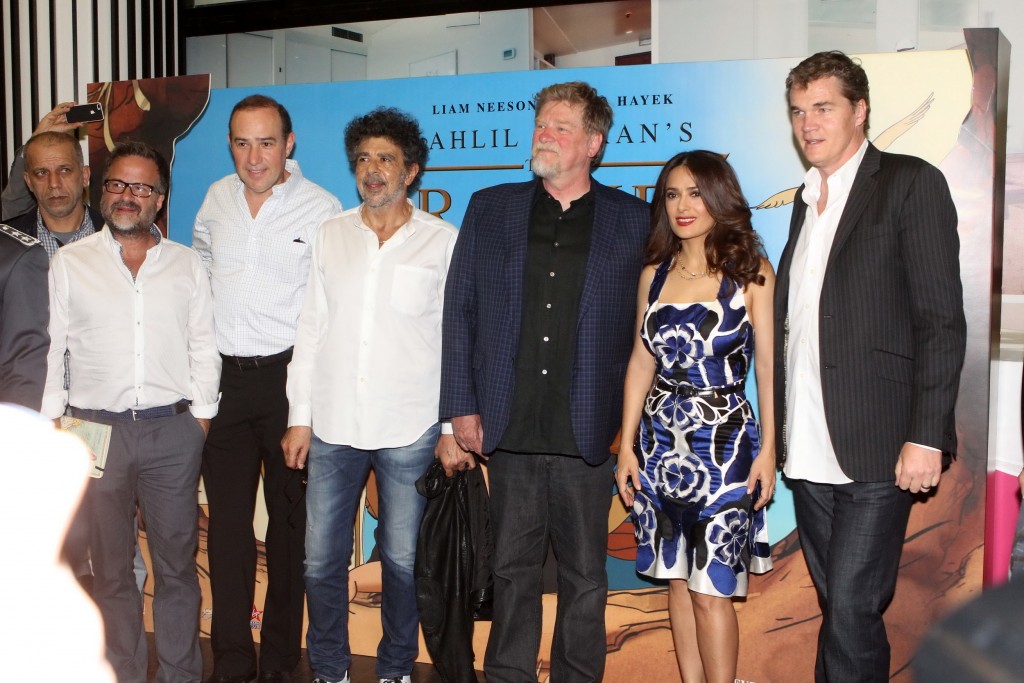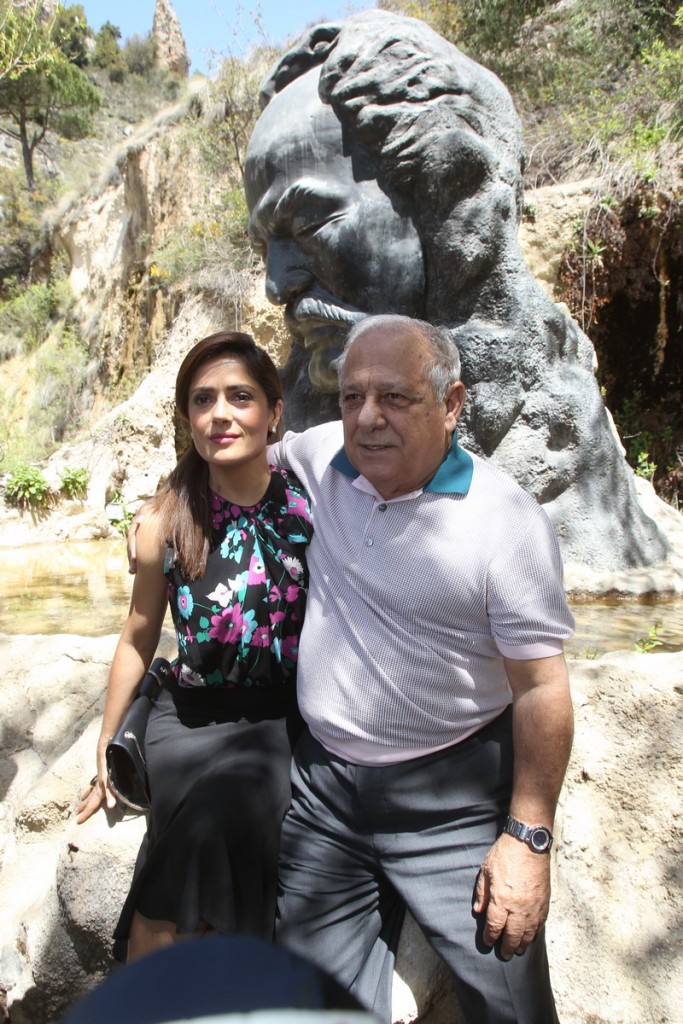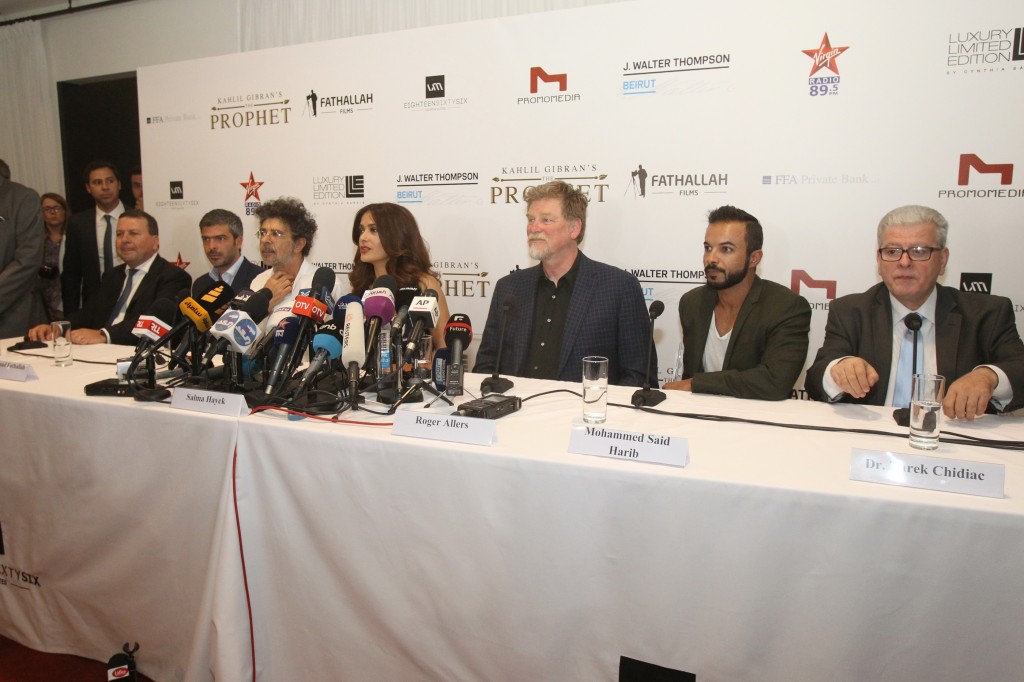During her visit to Lebanon to launch the movie The Prophet, taken from the masterpiece of Khalil Gibran, actress Salma Hayek of Lebanese origin held a press conference, to answer questions about the movie.
Salma Hayek, composer Gabriel Yared and director Roger Allers in front of The Prophet’s poster © Prestige
Salma Welcome to Lebanon, how did you find your visit to Becharré yesterday, what are the feelings you got from your visit to Gibran museum?
First of all, no one can imagine even with pictures how beautiful it is, nothing can prepare you to the beauty of those valleys, you can feel the energy of the history, everywhere you look, the beauty of nature is like a poem, impossible to describe, I was trying to describe to my child, my husband the beauty. I was overwhelmed, I have never seen anything like it, I was very moved. I’ve been so lucky that I was able to make that journey. For the museum, I want to thank the Khalil Gibran committee, without them we couldn’t have made this film, they were so welcoming, so helpful. They could have given these rights to so many other people, but I think it was our destiny, that we were the lucky ones. And it was wonderful to meet them, everywhere I go, it’s the embrace of love, I feel so welcomed. The museum for us was so moving, we got in the office, saw the paintings. I was surprised because I didn’t know that his tomb was there, and you know he says I am alive like you I am standing next to you, I have felt that he’s been with us all along, and I never felt it stronger then yesterday when we were there. I felt like we got a friend that we’ve been corresponding with for years, and finally somehow we got to shake his hand yesterday when we came to his museum.
Salma Hayek in front of Gibran’s statue with her father Samy Hayek during her visit to Becharré.©Prestige
What was the main idea that encouraged you to produce the film?
This is a known story, it has to do with my grandfather, who used to love this book and was very close to him. And then I rediscovered the book later because I was very young when he died, through this book I got to know my grandfather, through this book I got my grandfather teaching me about life, so it’s a very personal movie for me and I also wanted the world to put emphasis that there is an Arabic writer who wrote philosophy and poetry, and who brought all religions and all the world together and that has sold more than 100,000,000.00 copies around the world for many generations. And we wanted to do justice, we wanted the world to think about this and to remember this.
Why you decided to translate it into an animated film and what’s the reason behind this?
I did not start the project, the project started before me and it was Steve Hansen and Ron who got the rights then they were going to make it into live action, then they took it to Clark Peterson who is the producer and by then the idea was to make 13 poems in animation for less than half the budget, the idea together was to make a film that would be for the whole family and to bring a different kind of content to the young adults, to the teenagers, to the children since it was already thought out to be an animation which is brilliant because you can only capture poetry to art, Gibran was an artist himself. It was part of his way of expression, it was part of his voice so I thought there couldn’t have been a better way, to capture his spirit then through merging film, poetry, art and of course music and then to be able to tell the story like that, we had some of the artist already but we needed somebody who could talk to all the generations and this is where our director Roger Allers came in and the rest of the process about how that worked out with the different directors, you can ask him about.
Question to the director Roger Allers
Why to launch the movie from Lebanon, with all what’s going on in the Middle East? Tell us about your experience with animation, what brings you to the prophet?
I was given the book when I was nineteen, and the first times I read it, I had a very profound emotional experience, a very profound spiritual experience. It was like in the Zen practice when someone gives you a smack and you’re knocked to another region of consciousness, it’s truly like that and I’ve carried that with me all my life, and forty years later I had the opportunity to direct this movie, so it’s kind of a dream for me and it was a fascinating experience to work with animators from all the world and to encourage them to bring their own sensibilities to it. So in that way it was beautiful and very profound experience for me.
Salma Hayek in response to the question why launching it from Lebanon? To me it’s a love letter to my heritage, I have been dreaming to coming to Lebanon and every time I tried to come, something terrible happened. And I had a storm in my heart that I had traveled the world and I have never been able to come here and I have to say that I feel so much better today that I have been here, and from the beginning this movie could have not been made without the support of the Lebanese not only because of the Khalil Gibran committee, but also because we got most of the money from the region like Mr Jean Riachi and the Doha film institute, and also one of the first people that were involved in the movie and that was a champion was Mohamad so we promised him that we would come here first. This land is so important to me, God gave me the opportunity to come for the first time and to be able to bring something to it, not to come with my empty hands but to come with my heart and something to give to you that we are all very proud of. I want to make a plead to all the Lebanese, because we are opening the movie at the same time with Avengers and I would like to make a big statement to the world: this little movie from this little country that was made with so much love, we have to beat a big movie from a big country and when we succeed I want the world to know that here it was a special jewel, that made the people come to the theaters with their families to make us a statement to the world because this is a movie about unity and about uplifting our spirits.
Question to the director: The film includes many artists, what the inspiration behind this was?
The inspiration was to include many artists as we could so that they could bring their own vision to it as well, it wasn’t centralized, it wasn’t dictated. I want that here and I want that there, it was more an invitation to come and play together and have everybody express themselves in their own voice, in their own style, with their own vision. It is a cooperation of different artists rather than a domination, because it would make my job as a director rather brutal, it was a lovely cooperation.
A question to Gabriel Yared: I would like to salute you for all the work done in the past, how did it feel putting music to Khalil Gibran’s work, was it difficult, was it easy, was it an adventure in itself? What was the process you went through?
In animation you start composing music, in order to have an animation, in the process itself I had to start. In my own approach I always start before the shooting or during the shooting, I think the music would feed the film throughout not only at the end. I knew this book, I read it so many times until Salma came to me and she was so enthusiast about the project, it has triggered me because it is in relation with my roots, this lasted almost eight months, it’s not a work of last minute, it has forced me to go really deep inside to bring almost all, I had researched all my life to compose music, I had a lot of experience, coming back to my roots with such beautiful words, such beautiful poems, it was so satisfying, so creative, so I thank Salma for that.
Salma Hayek during the conference with the composer Gabriel Yared and the director Roger Allers. © Prestige
Dr Tarek Chidiac: On what basis you accepted as Gibran committee that film to be produced, how did you communicate with Salma Hayek, and what were the criteria?
Gibran’s committee has all the rights on The prophet in the USA, without any partner, even the publisher of the books in the US hasn’t got the right to give permission, because he is only a publisher, and he has to request from us the permission even if he has to use only one phrase from the Prophet. The idea came from the Gibran committee in 2008, 7 years earlier, it was at the time the jubilee of 125 years for the birth of Gibran, we had ideas and activities we wanted to realize in this subject. At that time, we realized important activities in Lebanon and outside Lebanon, we have a legal cabinet who contacted the lawyer of the American producer, and we communicated to make a contract with the agreement of both parties. Away from the legal aspect that was well conducted, the negotiations with us turned around the message that is in The Prophet, that Gibran wanted to transmit to all the people, to keep it without any amendments, as he wanted in the book to transmit it to the people. The presence of Salma Hayek and big names like Roger Allers and Gabriel Yared, these are an added value on the real value that is the ideas of Gibran, which is clear in the film with all the story that was created by the producer, to transmit these ideas and we are very happy, and we hope that the movie will be popular because it is fundamental for the ideas of Gibran, and fundamental for Lebanon.
Salma Hayek: We need a new prophet to unite the world, this is why it was so important to make this movie in a way that children could see it and that young people could see it, because I am hoping it would inspire someone to have a new vision for solution and this why it was important to do different kinds of animation. Because the movie is a completely different experience from any movie you’ve ever seen. We have the lovely beautiful story created by Roger, it’s about a little girl looking for her own voice, and the words of the Prophet are seen through her imagination. But it’s not always the same and every time we take you into a different journey, we break every rule in cinema, we break your expectations, you go somewhere and from that moment when you go it’s not about the movie, it’s about you, every single person takes something different. And we take a moment in a story to be with ourselves, and this is how life should be, we should go with our stories, we must take those moments to go inside, it encourages the new generation to go somewhere else, to break out of the boxes. Only by thinking in a new way, by using your imagination. By stretching our brains we will be able to find new ideas and only with new ideas we can change the world, because we’ve been repeating ourselves generation after generation. And with the music, with the animation, even with the people that supported with the money, and even with the great work they are doing, I want to stop and say one thing: this is the first time that this happens, because I’ve tried it many times before, in one place in the world, there is a movie that has been distributed, the profit of the movie goes to a charity. It’s never been done before because it’s not one person that has to agree, everybody involved in this film has to agree. And even the theatres have to agree. It’s a little example that everybody can come together to agree to be generous, to be compassionate to others. And I want the world to know that it happened for the first time here and it happened with this movie. So it is in all of our hopes that this movie inspires someone young to think something new.
Question to Mr Riachi: What attracted FFA into this project?
I had a special feeling for this book, I read it throughout my childhood. When Mohamad first came to us, telling us they were having problems raising the money for the movie and they knew we have raised money for other movies, I said ok show me the script, and there was no script. Who’s the director and there was no director, then he said Salma Hayek, I said waw, so if we have Salma Hayek we might raise the money, so I wanted to check if it was the real Salma Hayek so I called and went to Paris and had a lovely dinner with both of them. And she was so enthusiastic about the project so when I came back I said guys we have to raise this money I don’t care if we are killed by investors. I can tell you investors are so happy, some of them met Salma two days ago, they don’t care about making money, they want the world of Gibran and Salma Hayek and Roger and the music of Gabriel to spread the world.
We’ve seen through the movie that the tree gives the fruit and the roots take, what do you expect to give to Lebanon?
Mohamad Fathallah the distributor: it’s an honor for us Arabs that this is a movie that represents our culture, our heritage, our philosophy and the most beautiful written words any director can have. It’s a celebration of us Arabs and our creativity.
Salma: I was raised, I was educated like all Lebanese people are educated, to give back to Lebanon. I feel so angry, yesterday someone asked me: how do you like Lebanese food? Of course I know Lebanese food, I probably ate Kebbe before Tacos. I’m frustrated because I don’t speak Arabic, but I was raised all my life as a Lebanese. When we encounter a Lebanese in life, we immediately come together, there is a special bonding and I cannot tell you when I met Gabriel, who has become a pride for all of us Lebanese, and I have been a fan for a long time. I am glad to have fulfilled the expectations of my grandparents.








